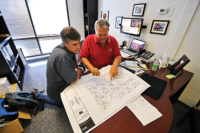The social media outlets are flooded these days with articles declaring that Millennials are taking over the workplace. The conversation continues in our offices as we deal with common assumptions about generational differences, such as “Baby Boomers can’t grasp social media” or “Millennials can’t commit to the same company for more than two years.” In light of such challenges, PSA Security Network has formed a leadership committee to help its members grapple with these issues. The group gathers to share tacit knowledge around management subjects and explores new approaches to leadership.
One such avenue for information exchange is a monthly book club. The committee selects works that explore both modern and historic leadership stories and methodologies that will lend some wisdom to the leadership theories and tactics at the heart of their discussions.
A recent book club discussion centered on a book called Rookie Smarts: Why Learning Beats Knowing in the New Game of Work, by Liz Wiseman. The author asserts that a rookie’s unbiased and fresh perspective can sometimes trump tenure when our experience blinds us to new possibilities, permits strategies to stale, and allows innovation to stall. Is it possible to maintain rookie freshness regardless of our time on the job? Or do breakthroughs and innovation really rest on the shoulders of a younger generation? The book club tackled this topic with passion and curiosity.
As the leadership committee readers challenged each other with the question of how they can be more flexible and garden-fresh in their perspectives, the replies ranged from the collaborative, “include young employees in your decision-making process,” to personal accountability, “attitude has a lot to do with it.” As some of the leaders pondered why and how we find ourselves in the less-fresh mode or even stale, they acknowledged that corner office-itis can easily set in for a busy executive trying to run an operation strictly from his or her keyboard. They admitted that losing touch with the field can mean losing the edge on new ideas, as learning something new often means getting out of the office and connecting with your people; that’s the kind of connection the Millennial worker highly treasures.
Perhaps, it was decided, we could use a refresher on our outlook to begin to see things with new eyes — but how? The team agreed that a daily reset involved leaders reminding themselves what it is about their work that makes it fun and exciting. Taking the time to do more of what you love and are passionate about in your work might require shifting some priorities in your schedule. Many times this means getting back in front of customers on sales calls, tinkering with new technology with your techs, expanding your awareness in an educational session or two at a conference, and finding ways to network with new people.
Openness, accessibility and availability of executives factored high on the scale of flatness prevention strategies and teambuilding. An open-minded leader is confident enough to bring rookies onto their team and allow them to experiment with new approaches, new technologies, and new directions for the business. It’s not easy to do and admittedly nerve-wracking for most managers. But when there is high risk, there is also potential for high reward. So, if a leader is to capitalize on their rookie talent, sometimes it’s about taking the chance on them and allowing them to find new ways to bring value to your organization. When you and your people learn and grow, new business ideas generally flow.
Rookie brilliance is not necessarily limited by age, the committee decided — and science agrees. If we commit to a course of action to flex our minds and our attitudes, our biology will support us regardless of age. The human brain has 10 billion neurons, making it the most powerful learning tool in the world. According to the Society for Neuroscience, as published on www.brainfacts.org, even “when the circuitry begins to break down, remaining neurons can adapt by expanding their roles and larger portions of the brain can be recruited so that older people can reach performance levels similar to those of younger adults.”
Despite which generational bucket your age dumps you into, each of us as individuals expects to be respected and valued for our distinct strengths. As leaders we must find a way to capitalize on the talents that each person brings across the generations and somehow make it all work so that the team remains productive, work remains progressive and we have fun at the same time.
Resources from PSA Security Network
Learn more about PSA Security Network’s Leadership Committee at www.psasecurity.com/education/committees/leadership
The Future of Work
Keynote speaker, author and futurist Jacob Morgan shares insights, ideas and commentary on the future of work in blogs and videos that run five minutes or less, titled, The Future in Five. Some of the topics are: “How to Stay Relevant in The Changing World of Work,” “What is The Biggest Barrier to Change?” “When Did ‘Manager’ Become a Bad Word?” and “Evolving from Knowledge Workers to Learning Workers.” Check it out at www.thefutureorganization.com/future-five/
Give & Take Among Generations
Check out this article on Monster.com, “What Older Workers and Younger Workers Can Learn from Each Other,” at career advice.monster.com/in-the-office/workplace-issues/generational-teachback/article.aspx




